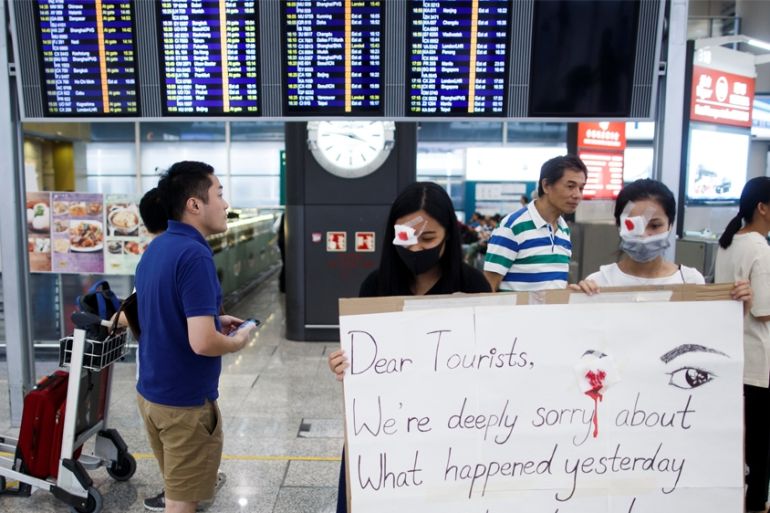Hong Kong Airlines delays salaries as airport eases slot rules
Hong Kong’s aviation authority suspended its ‘use-it-or-lose-it’ rule for take off and landing slots as demand falls.

Hong Kong Airlines Ltd has delayed salaries for almost half of its staff, saying business has been “severely affected” by social unrest in the city and sustained weak travel demand.
Only cabin crew and overseas employees will receive their November wages on time, while all other Hong Kong-based workers will be paid on December 6, the airline said in a statement on Friday. It said revenue dipped significantly in November, a low travel season, impacting the monthly payroll.
Keep reading
list of 3 itemsVirgin Australia axes Hong Kong route, trims domestic flights
Airlines ask Hong Kong to waive airport fees as demand drops
The city’s third-biggest carrier is not alone in feeling the heat from anti-government protests, but it is the first airline to hold back salaries because of the revenue squeeze.
Flag carrier Cathay Pacific Airways Ltd issued profit warnings as early as August after criticism from the Chinese government and protesters.
Cathay plans to cut passenger flight capacity by 1.4 percent next year, reversing an earlier plan to boost it by 3.1 percent, according to an internal memo reviewed by the Reuters news agency.
“Given the immediate commercial challenges and the fact that our position has deteriorated in recent weeks, we must take swift action to adjust our budget operating plan for 2020 downwards again,” Chief Executive Augustus Tang said in the memo.
A Cathay representative told Reuters the carrier had no comment about the plan.
More than five months of sometimes violent protests in Hong Kong have weighed heavily on the aviation sector by deterring visitors and pushing the local economy into recession.
The Hong Kong Civil Aviation Department announced on Friday that airlines flying to and from the city will be able to keep their prized airport slots, even if they temporarily cut capacity up until March 2020.
Many airlines, including Cathay, South African Airways and Malaysia’s AirAsia Group Bhd have cut flights on their Hong Kong routes temporarily as they struggle with a sharp fall in tourist and business travel demand.
Hong Kong’s Civil Aviation Department said in a statement to Reuters on Thursday evening that in order to provide airlines with greater flexibility in aircraft deployment to deal with the fall in passenger demand, its “use-it-or-lose-it” rule had been temporarily suspended for the winter season.
The “use-it-or-lose-it” rule stipulates an airline normally only keeps slots out of historic precedence if it can demonstrate it used them at least 80 percent of the time in the previous airline scheduling season.
The current winter season, which began on October 27, ends on March 28, 2020.
Under more normal conditions, it is tough for airlines to get take-off and landing slots at Hong Kong’s airport because of constrained capacity until a third runway comes into operation in 2024.
Airport Authority Hong Kong reported declines in October of 13 percent in passengers and 6.1 percent in the number of inbound and outbound flights – the steepest falls since the unrest began.
The unrest has disrupted transport networks and even temporarily paralyzed the airport in August, prompting Hong Kong Airlines at the time to say it would adjust services.
Hong Kong Airlines had cut some operations earlier this month and plans to cancel Los Angeles-bound flights from February. That was after a Hong Kong Transport and Housing Bureau review said the airline’s finances were a matter of concern and called for immediate steps to improve the situation.
More than 5,800 people have been arrested since the unrest broke out in June over a proposal to allow extraditions to mainland China, the numbers grew in October and November as violence escalated.